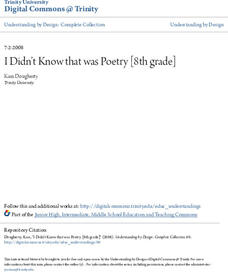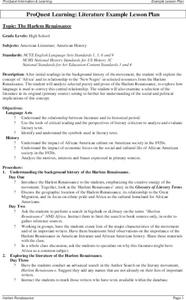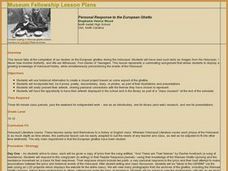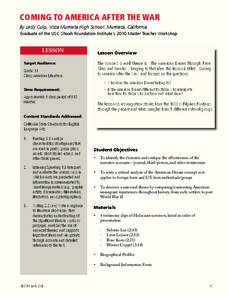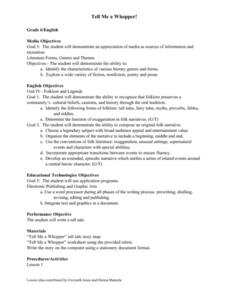Trinity University
I Didn’t Know that was Poetry
Poetry or prose? That is the question facing middle schoolers as they begin a month-long poetry unit by examining the characteristics that differentiate poetry and prose writing. Pupils learn about poetic devices and different types of...
ReadWriteThink
What is Poetry? Contrasting Poetry and Prose
Introduce middle schoolers to the different strategies used when reading prose versus poetry. Groups use a Venn diagram and a poetry analysis handout to compare the characteristics of an informational text and a poem on the same subject...
College of the Canyons
Free Verse
Free verse poetry is often regarded as poetry without structure, but in reality, it is a poetic form that adheres to its own poet's thought and breath patterns. Delve into the rules and famous examples of free-verse poetry with a short...
Curated OER
Extreme Poetry Vocabulary
Challenge your class with this comprehensive list of literary vocabulary words. Learners take a pre-test, look up definitions, come up with an example, and then take a post-test. You might use this prior to a unit about poetic devices in...
Harper Collins
Every Thing On It Lessons and Activities
Honor the great poet, Shel Silverstein with eighteen activities and lessons showcasing his collection of poems from the book, Every Thing On It. Activities challenge scholars to rhyme words, make inferences, recite a poem, and more!
Curated OER
Five Simple Poems
Students listen as the teacher explains what poetry is as well as describes several types of poetry such as haiku, free verse, limerick, cinquain, and an acrostic. Students read examples of each type of poetry. They compose a poem...
Curated OER
The Harlem Renaissance
Students, after researching/analyzing the movement "Harlem Renaissance" and Africa as well as reading literature from that time period, create lists of the major characteristics of the movement and its important writers. They bridge the...
Curated OER
Personal Response to the European Ghetto
Students examine the characteristics of the ghettos during the Holocaust. Reading various texts on the subject, they gather important information related to the event. They create a visual project of the ghettos and shares them with...
Curated OER
Three Coffles Lesson Plan
Students read about the slave trade in primary source documents. They discuss differences and commonalities in experiences. They write prose or poetry from the point of view of one of the figures from the reading and create a triptych.
Curated OER
Deerfield Families
To understand the consequences of the 1704 attack on Deerfield by combined French and Native American forces, groups research primary and secondary resources related to four Deerfield families involved in the attack.
University of Southern California
Coming to America After the War
As part of their exploration of the American dream, class members examine primary source materials to compare immigrant experiences of those arriving early in our country's history to those arriving in the US after World War II. To...
Curated OER
Always Allow Alliteration (part 1)
Students identify letters and sound that are being alliterated in a text they are given. For this alliteration worksheet, students also create alliteration in words and sentences.
Curated OER
Comparing Fiction and Nonfiction
Fifth graders compare and contrast an informational article with a fictional story. They read the story "The Contest" as a class, and discuss the different types of literature genres. Next, they complete a vocabulary worksheet and a...
Curated OER
Painted Dreams
Third graders explore the importance of art in Haitian culture by analyzing the cause and effect within the story, "Allie's Basketball Dream." They examine all the aspects of the story and characters including their goals, dreams,...
Curated OER
Unit Plan for Mark Twain and American Humor
Students create brochures about the humor of Mark Twain. In this literature-analysis lesson plan, students read "The Celebrated Jumping Frog of Calaveras County" and other short stories by Twain. Students write analytical paragraphs and...
Curated OER
The Stinky Cheese Man and Other Fairly Stupid Tales
Sixth graders demonstrate the ability to process and evaluate content from a variety of sources and apply comprehension skills to the material read. They organize information for practical use and design and develop an informational...
Curated OER
Lesson Three: Go Free or Die
Fourth graders look for sensory details and figurative language. In this reading strategy lesson, 4th graders read the story Go Free or Die by J. Ferris and complete a chart with figurative language. They use a word wall in the class to...
Curated OER
Twenty-one Balloons
Fifth graders determine what the Newbery Award is and why it is importance. They examine a number of Newbery Award winning books and listen to a book talk about William Pene DuBois', Twenty-One Balloons while watching a PowerPoint...
Curated OER
Exploring Alaska Foilage In Russian
Seventh graders investigate the concepts of how plants are part of daily culture in Russia. The skills of naming different plants is practiced. Students take a survey of the nature that is found in the area in which they live. This is...
Curated OER
A Day During Colonial Times
Fifth graders participate in read aloud activities of three books about life in Colonial times. They compare their life to that of children of Colonial times using a Venn diagram. They draw a picture and write about what a day in the...
Curated OER
Tell Me a Whopper!
Sixth graders investigate tall tales as a literary genre. They listen to a number of tall tales to discover how exaggeration is used as a story element. They write and publish a tall tale using word processing software. They illustrate...


